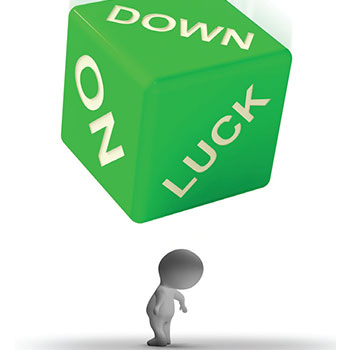Lucky? Unlucky?

Why do some people get all the luck, while others don’t? Or is that statement valid? Not, according to Prof. Richard Wiseman, who conducted experiments to find out just that. Then what is it that makes some people or countries, turn more successful than the others? Read on, to find out…
Nobody is lucky or unlucky. It is our self-created demarcation. Your talent determines what you can do. Your motivation determines how much you are willing to do. Your attitude determines how well you do it. To realise your dreams, it is essential to cultivate a mindset of positivity and resilience, regardless of the obstacles life places in your way
Why do some people get all the luck, while others never get the breaks they deserve? There is no need to go to astrologers for the answer as it can be had from the behaviour of the persons themselves. This is what an eminent psychologist, Professor Richard Wiseman believes, based on his experiments.
Wiseman set out to examine as to why some people are always in the right place at the right time, while others consistently experience ill fortune. He placed advertisements in national newspapers asking for people who felt consistently lucky or unlucky to contact him. Hundreds of extraordinary men and women volunteered for his research. Over the years he interviewed and monitored their lives and even subjected them to his experiments.
He took up the task to discover whether the lucky and unlucky people were different due to the differences in their ability to spot opportunities. He gave both lucky and unlucky people a newspaper, and asked them to look through it and tell him how many photographs were inside. He had also placed a large message halfway through the newspaper saying: “Tell the experimenter that you have seen this and win $50.” This message took up half of the page and was written in a font that was more than two inches high. It was staring everyone in the face, but the unlucky people tended to miss it and the lucky people tended to spot it.
Open mind
Prof. Wiseman inferred that unlucky people are generally more tense than lucky people, and this anxiety disrupts their ability to notice the unexpected. As a result, they miss opportunities because they are too focused on looking for something else. They go to parties with the intent of finding a perfect partner and so miss opportunities to make good friends. They look through newspapers determined to find certain types of job advertisements and miss other type of job advertisements. Lucky people are more relaxed and open, and therefore see what is there rather than just what they are looking for.
Wiseman’s research eventually revealed that lucky people generate good fortune through four principles: they are skilled at creating and noticing chance opportunities; make lucky decisions by listening to their intuition; create self-fulfilling prophesies via positive expectations and adopt a resilient attitude that transforms bad luck into good.
Top tips to get lucky
Wiseman has four top tips for those who want to become lucky:
- Listen to your gut instincts, they are normally right
- Be open to new experiences, breaking your normal routine
- Spend a few moments each day remembering things that went well
- Visualise yourself being lucky before an important meeting or call
All have problems
The happiest people in the world are not those who have no problems but those who learn to live with things that are less than perfect. There is a great difference between “worry” and “concern”. A worried person only sees the problem and a concerned person solves the problem. You are the luckiest person in the world if you know what you really want to do. There are no shortcuts for success and one must keep one’s faith in something greater than the self. The secret of success is to do what one loves and to be creative. As per Prof. Wiseman, it is one’s personal behaviour and attitude that makes a person lucky or unlucky. One should introspect and find out what sort of a person one is and then determine to work on one’s limitation. There is nothing impossible and both behaviour and attitude can be corrected.
It is futile to talk about good luck and bad luck, as success is dependent upon honest efforts, skill and using the opportunity to one’s advantage. Linking failure to bad luck stops a person from making efforts and he falls further. Our scriptures and particularly our ‘Bhagavad Gita’ says that one should keep on doing his ‘Karma’ and should not dwell on success or failure. Doing work is in our hands and that should be done honestly and passionately. Failures may come, and the same require repeated efforts and not abandoning the work undertaken, linking failure to bad luck.
Stalwarts of success
Let us take some examples of successful people who started from the bottom to reach the top of the pyramid. Dhirubhai Ambani started his career from being an attendant at a petrol pump in Aden and ended in building the Reliance group. One may say that he was very lucky but the fact remains that he dreamt big and went on climbing the stairs. Ambition, coupled with passion and honest hard work, made him what he became. Microsoft and Apple, the two biggest technology companies were built by school dropouts. Bill Gates and Steve Jobs had no formal degrees but they had the passion and the dream to create Microsoft and Apple respectively. Luck, if it exists, also helps those who make honest endeavour. We generally ascribe success with good luck but fail to recognise attitude, skill and sincere effort.
Let us also take the case of our own Prime Minister Narendra Modi. He comes from a poor family. He used to sell tea at a railway station when he was a child. Today, he is not only our Prime Minister but also the most popular world leader. One can say that he was lucky, but the fact remains that he left home early in life and worked hard, firstly in the field of spiritualism and secondly as an RSS worker. He got so much grassroot experience that when the opportunity came to join as a political executive, he excelled. Albert Einstein once said, “Success is one per cent inspiration and ninety-nine per cent perspiration.” People cannot be successful without hard work. Oprah Winfrey once said in an interview, “Luck is a matter of preparation meeting opportunity.” Circumstances and situation give an occasion of ‘opportunity’, and recognising the ‘opportunity’ at best can be said to be linked with luck, but even there it is your skill and your attitude, which come into play.
Wiseman’s research eventually revealed that lucky people generate good fortune through four principles: they are skilled at creating and noticing chance opportunities; make lucky decisions by listening to their intuition; create self-fulfilling prophesies via positive expectations and adopt a resilient attitude that transforms bad luck into good
Successful countries

As in individuals, where hard work and skill make a person successful, so it is in the case of countries. India and China became independent almost together and both were almost equally poor countries. But then Deng Xiaoping became the executive head of China in the late seventies and took the opportunity to make China a rich country by learning from developed capitalist countries. Today China is the second biggest world economy after the USA and five times bigger than India. He advised that for becoming successful, one should keep a cool head while maintaining a low profile, and should aim to do something big. He always said, “It does not matter if a cat is black or white, so long as it catches mice.” He worked for success and only success, and succeeded.
Today, in the last ten years, even India has become the fifth biggest world economy due to hard work done by our leadership and also by us Indians. This proves that working hard and taking advantage of opportunities can even make countries more developed.
In life, the path to success is often winding and steep, filled with obstacles and challenges. However, it is the courage to continue that counts. After all, success is not just about achieving goals but also about the journey and the learnings along the way. It is about the resilience to bounce back from failures and the determination to keep going despite the odds. Success is deeply personal and unique to each individual. Success for one might not be the same for another. For Einstein it was “Strive not to be a success but rather to be of value.” Success is not the key to happiness but happiness may work as the key to success.
Success or good luck can be achieved from failure without loss of enthusiasm. One should always be oneself, having faith in self and avoid blindly imitating successful personalities. Doubts kill more dreams than failures ever will. Success is not final and failure is never fatal. Embracing your passion can be challenging, particularly when grappling with self-doubt or questioning your abilities.
Luck is directed hard work
We should follow what Thomas Jefferson said, “I find that the harder I work, the more luck I seem to have.” Nobody is lucky or unlucky. It is our self-created demarcation. Your talent determines what you can do. Your motivation determines how much you are willing to do. Your attitude determines how well you do it. To realise your dreams, it is essential to cultivate a mindset of positivity and resilience, regardless of the obstacles life places in your way. Let us not delay in making our future. “The future depends on what you do today,” said Mahatma Gandhi. Do not depend on your destiny but depend upon yourself. Everybody has ability but most of the failures are connected with our directionless exploiting of our abilities. The lucky ones know this.